复习七年级下Unit2的重点知识和语法点
七下第二单元语法要点英语
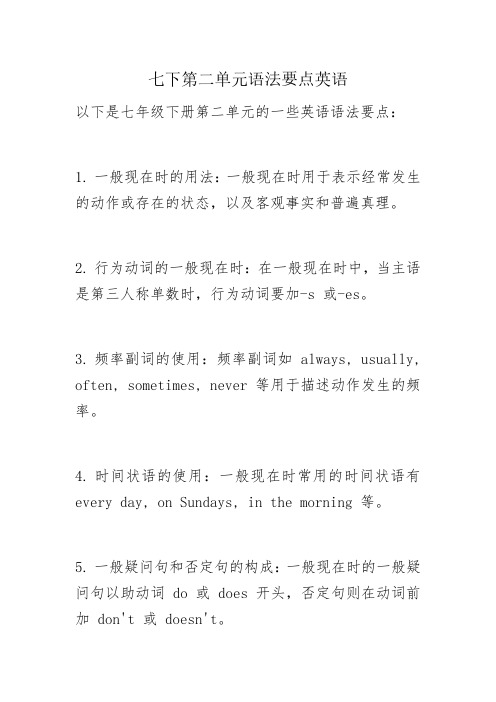
七下第二单元语法要点英语
以下是七年级下册第二单元的一些英语语法要点:
1.一般现在时的用法:一般现在时用于表示经常发生的动作或存在的状态,以及客观事实和普遍真理。
2.行为动词的一般现在时:在一般现在时中,当主语是第三人称单数时,行为动词要加-s或-es。
3.频率副词的使用:频率副词如always,usually, often,sometimes,never等用于描述动作发生的频率。
4.时间状语的使用:一般现在时常用的时间状语有every day,on Sundays,in the morning等。
5.一般疑问句和否定句的构成:一般现在时的一般疑问句以助动词do或does开头,否定句则在动词前加don't或doesn't。
6.介词的用法:介词用于表示时间、地点、方位等。
7.名词所有格的构成:名词所有格用于表示所属关系,通常在名词后加's。
8.形容词性物主代词的用法:形容词性物主代词用于修饰名词,起到限定作用。
这些是七年级下册第二单元的一些语法要点,希望对你有所帮助!。
人教版七年级英语下册Unit 2知识点汇总
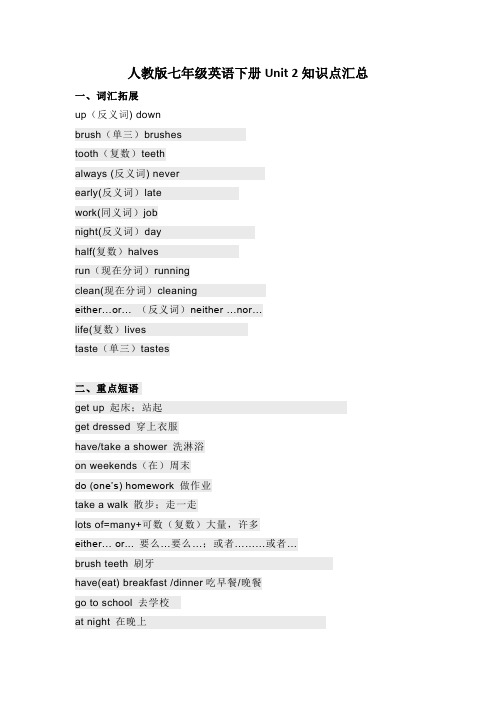
人教版七年级英语下册Unit 2知识点汇总一、词汇拓展up(反义词) downbrush(单三)brushestooth(复数)teethalways (反义词) neverearly(反义词)latework(同义词)jobnight(反义词)dayhalf(复数)halvesrun(现在分词)runningclean(现在分词)cleaningeither…or… (反义词)neither …nor…life(复数)livestaste(单三)tastes二、重点短语get up 起床;站起get dressed 穿上衣服have/take a shower 洗淋浴on weekends(在)周末do (one’s) homework 做作业take a walk 散步;走一走lots of=many+可数(复数)大量,许多either… or... 要么…要么…;或者………或者…brush teeth 刷牙have(eat) breakfast /dinner吃早餐/晚餐go to school 去学校at night 在晚上from…to… 从……到……in the morning/ afternoon /evening 在上午/下午/晚上go to work 去上班That's a funny time for… 那是做……有意思的时间。
be late for………迟到on school days 在上学期间a quarter past /to+钟点数……过/差一刻钟go to bed 上床睡觉half past +钟点数……点半go home回家eat quickly 吃得快play sports 做运动have much time for …有许多时间做……for half an hour 半小时get home 到家eat a good breakfast 早餐吃得好,好好吃一顿早餐eat … for lunch午餐吃……after lunch /dinner 午餐/晚餐后be (not) good for 对……健康有(没)益taste good 尝起来好吃have a very healthy life 有健康的生活need to do … 需要做……from Monday to Friday从周一到周五radio station 广播电台make breakfast for sb. 替某人做早饭get to school 到校三、经典句型1.---What time do you usually get up,Rick?里克,你通常几点起床?---I usually get up at six thirty.我通常六点半起床2.---When does Scott go to work?斯科特什么时候去上班?---He always goes to work at eleven o'clock.他总是在十一点去上班。
人教七年级下unit2语法
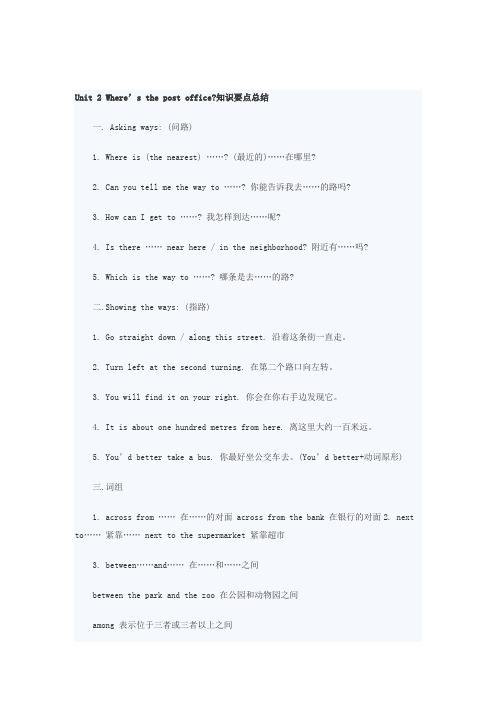
Unit 2 Where’s the post office?知识要点总结一. Asking ways: (问路)1. Where is (the nearest) ……? (最近的)……在哪里?2. Can you tell me the way to ……? 你能告诉我去……的路吗?3. How can I get to ……? 我怎样到达……呢?4. Is there …… near here / in the neighborhood? 附近有……吗?5. Which is the way to ……? 哪条是去……的路?二.Showing the ways: (指路)1. Go straight down / along this street. 沿着这条街一直走。
2. Turn left at the second turning. 在第二个路口向左转。
3. You will find it on your right. 你会在你右手边发现它。
4. It is about one hundred metres from here. 离这里大约一百米远。
5. You’d better take a bus. 你最好坐公交车去。
(You’d better+动词原形)三.词组1. across from ……在……的对面 across from the bank 在银行的对面2. next to……紧靠…… next to the supermarket 紧靠超市3. between……and……在……和……之间between the park and the zoo 在公园和动物园之间among 表示位于三者或三者以上之间4. in front of……在……前面 There is a tree in front of the classroom.课室前面有棵树。
in the front of……在……(内)的前部 There is a desk in the front of the classroom.课室内的前部有张桌子。
七下英语第二单元笔记
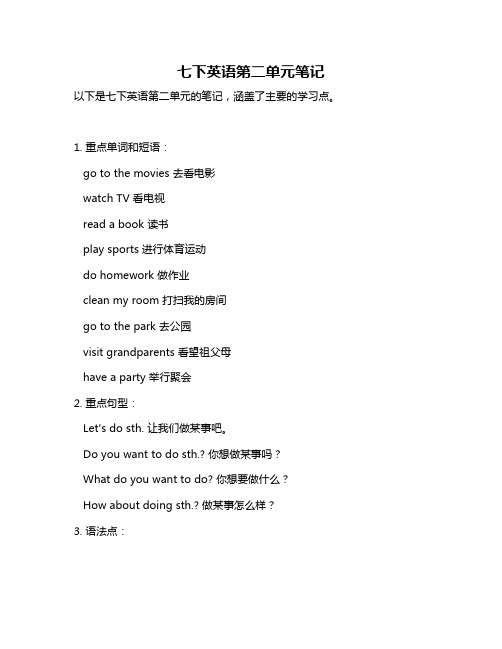
七下英语第二单元笔记以下是七下英语第二单元的笔记,涵盖了主要的学习点。
1. 重点单词和短语:go to the movies 去看电影watch TV 看电视read a book 读书play sports 进行体育运动do homework 做作业clean my room 打扫我的房间go to the park 去公园visit grandparents 看望祖父母have a party 举行聚会2. 重点句型:Let's do sth. 让我们做某事吧。
Do you want to do sth.? 你想做某事吗?What do you want to do? 你想要做什么?How about doing sth.? 做某事怎么样?3. 语法点:现在进行时态(Present Continuous Tense):表示正在进行的动作或正在发生的事情。
结构为“be动词(am/is/are)+动词的现在分词(ing形式)”。
例如:I am watching TV.(我正在看电视。
)动词的ing形式的构成:大多数动词在词尾加“-ing”,如“watching”;以不发音的字母e结尾的动词,先去掉e再加“-ing”,如“reading”;以重读闭音节结尾的动词,如果末尾只有一个辅音字母,应先双写这个字母再加“-ing”,如“running”。
4. 学习建议:结合教材中的对话和活动,多练习使用重点单词和短语,提高口语表达能力。
注意现在进行时态的用法,掌握其基本结构和变体形式,以便在实际语境中运用自如。
除了教材中的例句,可以自己尝试造句,锻炼语言组织能力。
结合个人生活实际,思考自己经常做的事情,用英语表达出来,提高实际应用能力。
人教版初一七年级英语(下)第二单元Unit2知识点+语法整合
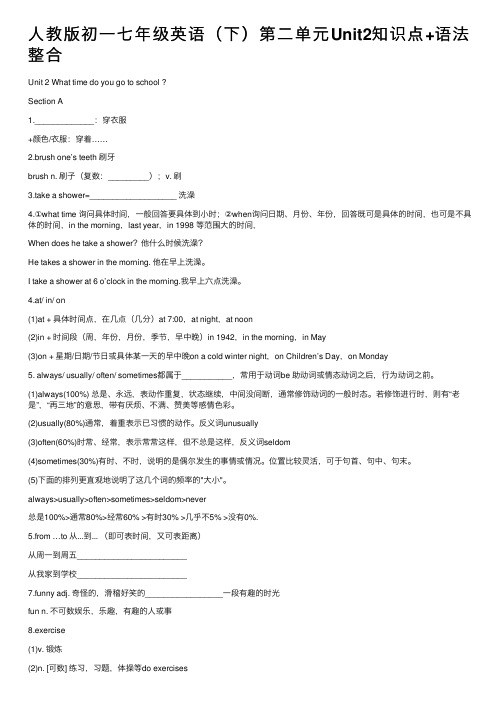
⼈教版初⼀七年级英语(下)第⼆单元Unit2知识点+语法整合Unit 2 What time do you go to school ?Section A1._____________:穿⾐服+颜⾊/⾐服:穿着……2.brush one’s teeth 刷⽛brush n. 刷⼦(复数:_________);v. 刷3.take a shower=___________________ 洗澡4.①what time 询问具体时间,⼀般回答要具体到⼩时;②when询问⽇期、⽉份、年份,回答既可是具体的时间,也可是不具体的时间,in the morning,last year,in 1998 等范围⼤的时间,When does he take a shower?他什么时候洗澡?He takes a shower in the morning. 他在早上洗澡。
I take a shower at 6 o’clock in the morning.我早上六点洗澡。
4.at/ in/ on(1)at + 具体时间点,在⼏点(⼏分)at 7:00,at night,at noon(2)in + 时间段(周,年份,⽉份,季节,早中晚)in 1942,in the morning,in May(3)on + 星期/⽇期/节⽇或具体某⼀天的早中晚on a cold winter night,on Children’s Day,on Monday5. always/ usually/ often/ sometimes都属于___________,常⽤于动词be 助动词或情态动词之后,⾏为动词之前。
(1)always(100%) 总是、永远,表动作重复,状态继续,中间没间断,通常修饰动词的⼀般时态。
若修饰进⾏时,则有“⽼是”,“再三地”的意思,带有厌烦、不满、赞美等感情⾊彩。
(2)usually(80%)通常,着重表⽰已习惯的动作。
Unit2知识点讲解人教版英语七年级下册

1.英语钟点时刻的表达在英语中,钟点时刻的表达除了用阿拉伯数字(如8:10,12:45)外,还可以用以下几种表达方式。
◆当时间是整点时,可用“钟点数+o'clock”来表达,其中o'clock可以省略。
如:6:00 → six (o'clock) 11:00 → eleven (o'clock)◆当时间不是整点时,表达方式有以下两种:1. 钟点数+分钟数。
如:9:08 → nine eight 14:40 → fourteen forty2. 分钟数+ past / to +钟点数1) 当分钟数小于30时,用“分钟数+ past +钟点数”表示“几点过几分”。
如:8:09 → nine past eight7:25 → twentyfive past seven2) 当分钟数大于30时,用“(60-分钟数) + to +下一个钟点数”表示“差几分到几点”。
如:11:40 → twenty to twelve 2:58 → two to three注意:在分钟数中,15分钟还可以用a quarter表示,30分钟还可以用half来表示。
如:11:15 → a quarter past eleven8:45 → a quarter to nine13:30 → half past thirteen◆ A.M.(a.m.)和P.M.(p.m.)在12小时制中,我们可以用A.M.(a.m.)和P.M.(p.m.)来区分上、下半天。
A.M.(a.m.)意为“午前、上午”; P.M.(p.m.)意为“午后、下午”。
如:早上六点半→ 6:30 a.m. / half past six in the morning中午十二点→ 12:00 p.m. / 12 o'clock in the daytime午夜十二点→ 12:00 a.m. / 12 o'clock at night / at midnight【运用】用两种方式写出下列时间的英语表达1. 2. 3.___________________ 或___________________ ___________________或______________________________________或___________________参考答案1. four thirty; half past four2. eleven five; five past eleven3. nine fifteen; a quarter past nine2. what time & when 引导的特殊疑问句what time和when均可对时间状语进行提问,用来询问什么时间。
人教版英语七年级下册Unit2【重点短语+词法语法句法精讲】
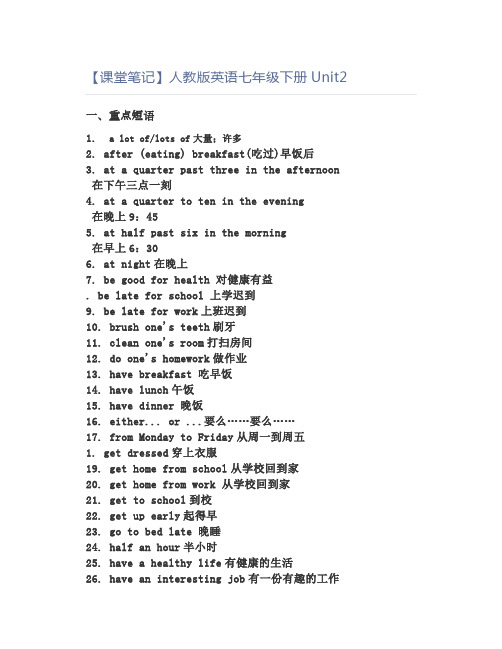
【课堂笔记】人教版英语七年级下册Unit2一、重点短语1. a lot of/lots of大量;许多2. after (eating) breakfast(吃过)早饭后3. at a quarter past three in the afternoon 在下午三点一刻4. at a quarter to ten in the evening在晚上9:455. at half past six in the morning在早上6:306. at night在晚上7. be good for health 对健康有益. be late for school 上学迟到9. be late for work上班迟到10. brush one's teeth刷牙11. clean one's room打扫房间12. do one's homework做作业13. have breakfast 吃早饭14. have lunch午饭15. have dinner 晚饭16. either... or ...要么……要么……17. from Monday to Friday从周一到周五1. get dressed穿上衣服19. get home from school从学校回到家20. get home from work 从学校回到家21. get to school到校22. get up early起得早23. go to bed late 晚睡24. half an hour半小时25. have a healthy life有健康的生活26. have an interesting job有一份有趣的工作27. take a walk散步2. on school nights在上学的晚上29. take a shower洗淋浴30. work at a radio station在电台工二、重点句型1.—What time/When do you usually exercise?你通常什么时候锻炼?—I usually exercise at five o'clock.我通常在5点锻炼。
人教七年级下册英语unit2知识点总结
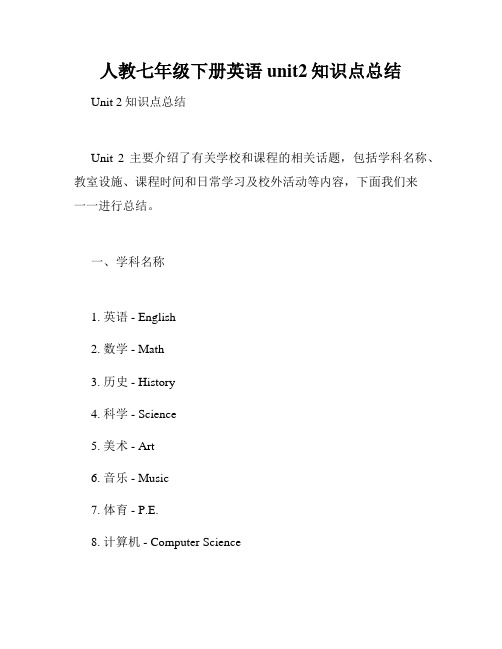
人教七年级下册英语unit2知识点总结Unit 2知识点总结Unit 2主要介绍了有关学校和课程的相关话题,包括学科名称、教室设施、课程时间和日常学习及校外活动等内容,下面我们来一一进行总结。
一、学科名称1. 英语 - English2. 数学 - Math3. 历史 - History4. 科学 - Science5. 美术 - Art6. 音乐 - Music7. 体育 - P.E.8. 计算机 - Computer Science二、教室设施1. 黑板 - blackboard2. 白板 - whiteboard3. 投影仪 - projector4. 音响 - sound system5. 地图 - map6. 水龙头 - tap7. 电视 - TV8. 电脑 - computer9. 灯 - light10. 窗户 - window三、课程时间1. 上午 - in the morning2. 下午 - in the afternoon3. 晚上 - in the evening4. 早上 - in the early morning5. 夜晚 - at night6. 每周 - every week7. 每天 - every day8. 周末 - on weekends四、日常学习1. 做作业 - do homework2. 练习 - practice3. 复习 - review4. 读书 - read books5. 写作 - write compositions6. 讨论 - have discussions7. 板书笔记 - take notes8. 教师讲解 - teacher's explanation9. 学习笔记 - study notes10. 做练习 - do exercises五、校外活动1. 课外活动 - extracurricular activities2. 运动会 - sports meeting3. 聚会 - party4. 社交活动 - social activities5. 英语角 - English corner6. 爱好小组 - hobby group7. 社团活动 - club activities8. 学校之旅 - school trip以上就是Unit 2的主要内容,希望能够帮助大家更好地学习英语,更好地了解学校和课程的相关话题。
- 1、下载文档前请自行甄别文档内容的完整性,平台不提供额外的编辑、内容补充、找答案等附加服务。
- 2、"仅部分预览"的文档,不可在线预览部分如存在完整性等问题,可反馈申请退款(可完整预览的文档不适用该条件!)。
- 3、如文档侵犯您的权益,请联系客服反馈,我们会尽快为您处理(人工客服工作时间:9:00-18:30)。
5、You can post a letter to your penfriendin a post o________.
6、She is _________(在两者之间) Tom and Jack..
7、The pay p______ isnearthe school.
---I’m going theremy car.
A. inB. byC. on
5. ---Do you like the music of the Moonlight Sonata?
---Yes, itreally beautiful.
A. feelsB. soundsC. listens
6. Miss Ma always helpswithEnglish.
A. an egg and two meatsB. two apples and some milk.
C. three potatoes and many rice .D. four orange juice and a lot of yogurt .
4. ---How are you going to the rain station to meet your aunt?
12. Miss Ma always helpswithEnglish.
A. I, myB. me, myselfC. me, my
13. Whatto you just now?
A. did happenedB. happenedC. happens
14. The foodmy country is quite differentthat inJapan.
"No, sir. He was too busy last night, so I had to do it all myself," said Tim.
Step 1重点词汇和短语
一、朗读下面单词并翻译。
post,office,restaurant,library,supermarket,bank,park,pay,street,center,mail,near,bridge,across,between,front,behind,excuse,straight,turn,left,right,down
2. There were aboutfilms on show during the Film Festival.
A. two hundred ofB. two hundredC. two hundreds
3. --What’s in the fridge?
--Only ______________.
8. Iseasy to finish the project before National Day?
A. itB. thatC. this
9. The car is running. It seems to be flying.
A. more and more fastB. fast and fastC. faster and faster
A. in, fromB. from, toC. to, from
15. . --How do you like this city?
--Very much,But I think people here are the most _____.I’m so _______in their daily life.
10. The teacher told usExercise1 inour exercise books.
A. to doB. doC. doing
11. --can you _______French,Tom?
--Yes,but only a little.
A. sayB. speakC.nterestingB. interesting;interested
C. interested;interestedD. interesting;interesting
Did your dad help you?
One day, Tim's math teacher looked at his homework and saw that he had got all his sums right. The teacher was very pleased-and rather surprised. He called Tim to his desk and said to him, "You got all your homework right this time, Tim. What happened? Did your father help you?"
A. I, myB. me, myselfC. me, my
7. ---Here is the paper for you!
---Oh, thanks. It’sfor me to write a long letter on.
A. big enoughB. enough largeC. small enough
卓越个性化教案GFJW0901
学生姓名年级初二授课时间2011.08.05.教师姓名课时2
教学目标
复习七年级下Unit2的重点知识和语法点
重点难点
1. ---What would you like, Madam?
---I’d like, please.
A. two bottles of orangeB. two bottle of orangesC. two bottle of oranges
二、在括号里填上适当的单词。
1、The _________(餐馆)isnext tothe school.
2、There are a lot of books in the l___________.
3、If(如果)you have much money, you can put it in a b________
